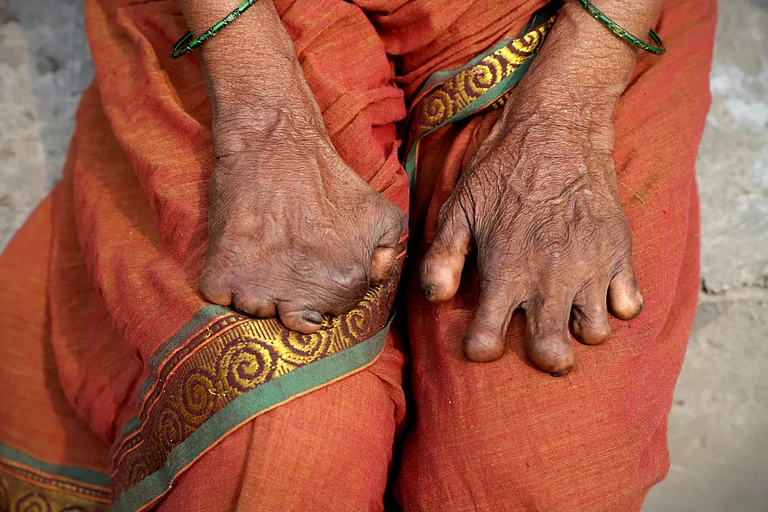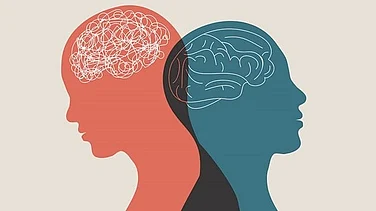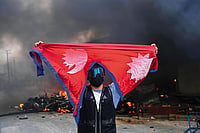
Summary of this article
Outlook and The Banyan have documented, archived and reported on the importance of mental healthcare in India.
The need remains to persistently highlight problems and challenges the mentally unwell face.
But equally important, especially when it comes to countering stigma, is to explore the inner world of those living with mental illness.
Back in our January 10, 1996 issue, Outlook featured two young changemakers, Vandana Gopikumar and Vaishnavi Jayakumar, co-founders of The Banyan, Chennai, in our Voices section, which highlighted a small handful of people dedicated to the betterment of society.
Nearly three decades later, the story comes full circle: In August 2025, The Banyan and Outlook joined hands once again, this time to mark Independence Day with a special issue on freedom from the stigma associated with mental health.
Here is a look at the past as well as the current issue's key highlights:
Trigger warning: The issues and topics discussed in the stories and essays linked below might be triggering for some people. These include discussions and reports about or related to self harm, domestic abuse, and other forms of violence and suffering.
Love, Loss And Mental Illness | Freedom From Stigma
In the introduction to our August 2025 mental health special issue, Outlook sets the stage by outlining the intersecting challenges that shape mental health in India:
"Millions of Indians navigating mental health needs simultaneously confront gender violence, caste discrimination, religious persecution, extreme poverty and other forms of marginalisation. They face compound burdens, what scholars call ‘double jeopardy’: social inequities layered atop mental health stigma. One part of stigma is the alienation of people with psychosocial disabilities from social and economic spaces. The other rests in the low priority and lack of resources, including the work needed to build better therapeutics, to advance mental health across the population."
In a candid conversation with Outlook editor Chinki Sinha, Banyan co-founder Vandana Gopikumar revisits the journey since 1996: reflecting on what people living with psychosocial disabilities truly need, how society should (and should not) respond, and the unfinished work that lies ahead.
Lakshmi Narasimhan, a mental health researcher and practitioner associated with The Banyan's BALM project, explains how 'Mental Health Affects Every Corner Of Indian Society'. She writes, "The special issue is our attempt to center these aspects of mental health as an issue of freedom through testimonies that reflect the layered realities of mental health in contemporary India: of women living with serious mental illness and histories of homeless, families shattered by mob lynching, undertrials forgotten by justice, Kashmiris navigating decades of conflict, Doms engaged in historically caste-mandated professions and more."
Outlook reporter Yasir Iqbal narrates stories of loss from Kashmir, where enforced disappearances have forced families to live perpetually in fear and worry for their missing relatives, children, friends. Read accounts from the Valley in 'Invisible Scar: Kashmir’s Battle with Mental Health and the Missing', a telling narration of the psychosocial dimension of mental illness, as opposed to the personal or individual, which often becomes the focus.
Mohammad Ibrahim writes about believing in miracles in My Mother’s Keeper: My Life As Pagli’s Son, a personal account that takes the issue of stigma head-on. The well-known cinematographer narrates his mother's struggles with mental illness, which became a family's struggle and, mostly also his own.
Swati Subhedar, Outlook journalist, travels to the Hindi heartland, Uttar Pradesh's Awadh region, finding healers, mystics, charlatans, all feeding off the stigmatisation of mental illness, and the lack of institutional support to the unwell and their families. In UP's Mental Health Crisis: Rural Poor Are Slipping Through The Cracks, a video story, she explores the extent of the challenges in the state: It is not just the best intentions that Uttar Pradesh needs, but also the best possible allocation of resources.
Outlook journalist Mohammad Asghar explores the conditions within one of India's well-known mental healthcare institutions near Ranchi in Jharkhand. "Over the years, Priya has become a beloved presence in the female section, giving hundreds of inmates a reason to smile, including Sunita, who had never imagined her devastating domestic trauma would leave her behind these walls. When her husband abandoned her, Sunita returned to her maternal home, but found no peace there...," her reports in Inside A Mental Health Facility Near Ranchi: Forgotten Women Cry For Home.
In 'The Boy Who Was Never There', an Outlook reader recounts her childhood memory of a fellow student who struggled with a crisis that few could recognise for the longest time. Everyone believed the boy's tale, writes Deepika Singh. 'After all, the things he spoke about did happen in the world...'





















